Key takeaways:
- Pro-life advocacy emphasizes the value of every human life and requires empathy and support for individuals facing unplanned pregnancies.
- Fundraising is vital for advocacy as it facilitates outreach, community engagement, and the provision of essential services to those in need.
- Effective fundraising strategies include personal storytelling, utilizing social media for outreach, and hosting community events to build relationships with supporters.
- Measuring success in fundraising involves assessing both financial contributions and the relational impact fostered within the community.
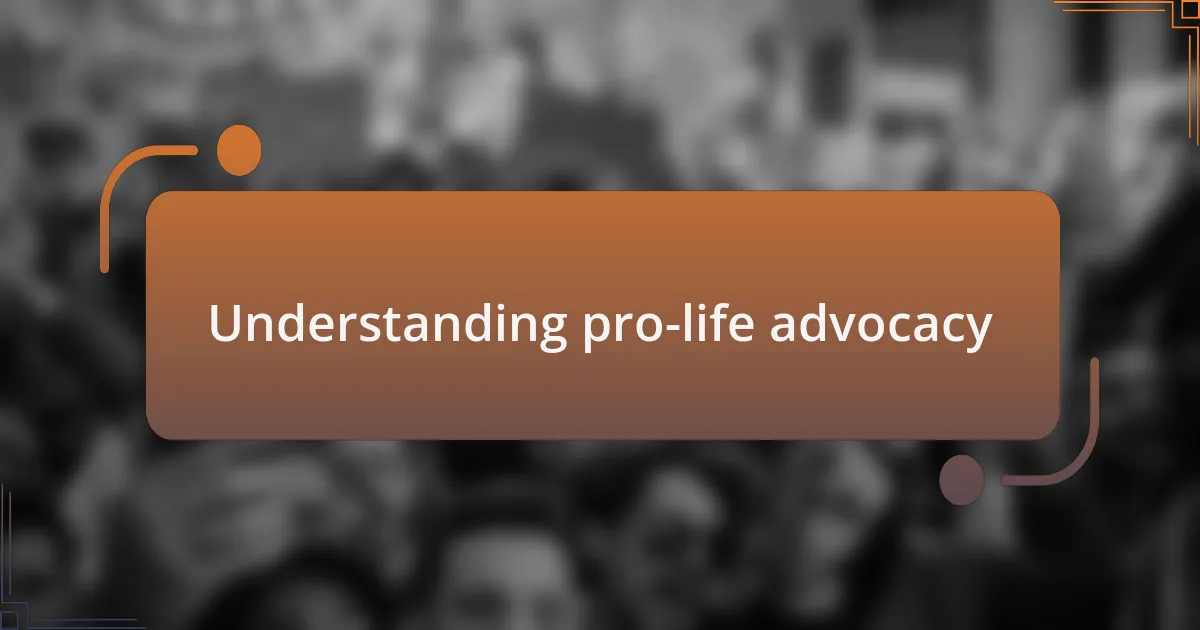
Understanding pro-life advocacy
Pro-life advocacy is deeply rooted in the belief that every human life has inherent value from conception until natural death. I recall attending a local pro-life rally where the passion in the voices of those around me struck me profoundly. It wasn’t just about legislation; it was about sharing stories and connecting on a level that truly highlighted the sanctity of life.
In my experience, understanding pro-life advocacy involves more than just core beliefs; it requires empathy towards individuals facing unplanned pregnancies and the challenges they encounter. Have you ever paused to consider the courage it takes for a young mother to choose life amidst overwhelming obstacles? Listening to their stories can profoundly change our perspective and drive us to advocate with compassion and understanding.
At its heart, pro-life advocacy calls for a holistic approach, promoting not only the protection of unborn children but also providing support for mothers and families. I remember volunteering at a pregnancy resource center, where I witnessed firsthand the importance of creating a nurturing environment for those in need. It reinforced my belief that being pro-life means being an ally throughout a person’s journey, understanding their fears, and celebrating their choices.
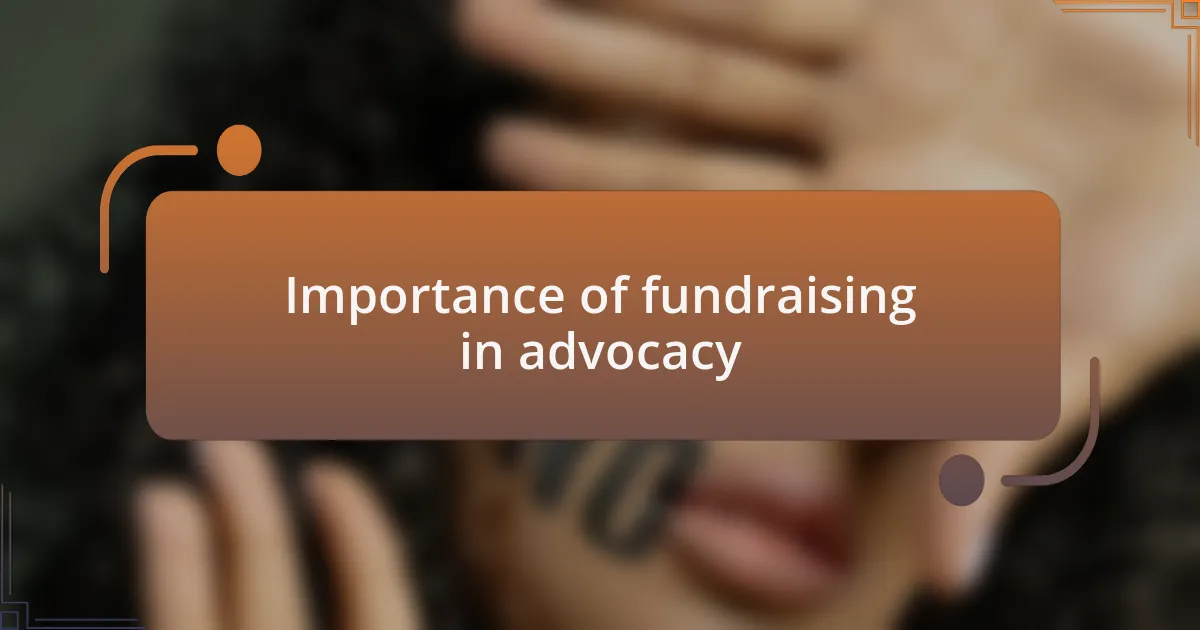
Importance of fundraising in advocacy
Fundraising is crucial in advocacy because it empowers organizations to effectively communicate their message and reach a broader audience. I remember the excitement during a fundraising event I attended; the energy in the room was palpable. The funds raised allowed the local group to enhance their outreach programs and provide vital resources for women facing unplanned pregnancies.
Without adequate financial support, the mission can stall. Have you ever considered how many essential services could be offered to families if the necessary funds were available? From educational workshops to counseling services, fundraising is the lifeblood that helps transform advocacy goals into tangible actions that make a real difference in people’s lives.
Moreover, successful fundraising fosters community engagement and solidarity among advocates. During a recent campaign, seeing members come together to pool resources and share their time was inspiring. It transformed the fundraising effort into a collective vocation, where each contribution—big or small—became part of a larger narrative advocating for life and love.
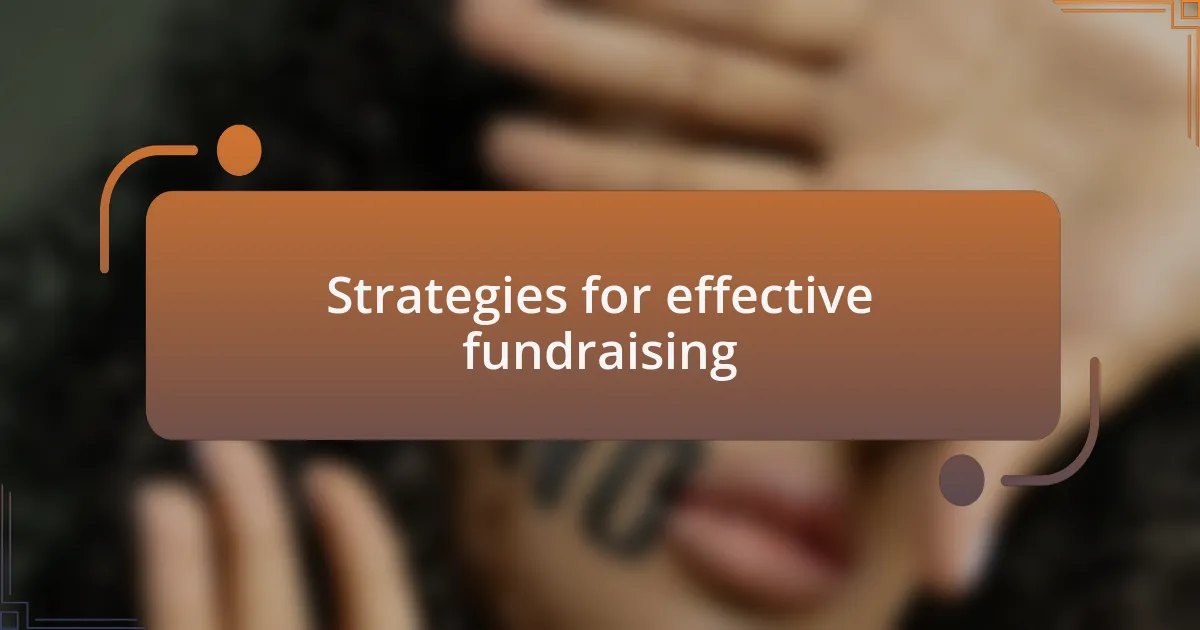
Strategies for effective fundraising
When it comes to effective fundraising, tapping into personal stories can significantly enhance your efforts. I once shared my own experience with a community project that successfully provided resources for expecting mothers. The emotional resonance of that story not only drew in donors but also created an immediate connection with our cause. Have you ever noticed how a heartfelt narrative can illuminate the impact of your work? That’s the kind of connection that translates into donations.
Another strategy involves leveraging social media platforms to amplify your reach. I recall a campaign where we created a series of short videos that highlighted the voices of families we had supported. The response was overwhelming; not only did it boost donations but also increased our online visibility. Have you thought about how powerful visual storytelling can be in persuading potential donors? Engaging people in this modern landscape requires creativity and relatability, which social media is perfect for.
Finally, hosting community events can cultivate meaningful relationships with potential supporters. I remember organizing a local dinner where participants could hear directly from beneficiaries of our programs. The joy and gratitude radiating in that room fostered a sense of belonging among attendees. Isn’t it fascinating how personal interactions can be a catalyst for continued support? Building those relationships can lead to long-term partnerships that sustain your mission well beyond the initial fundraising efforts.
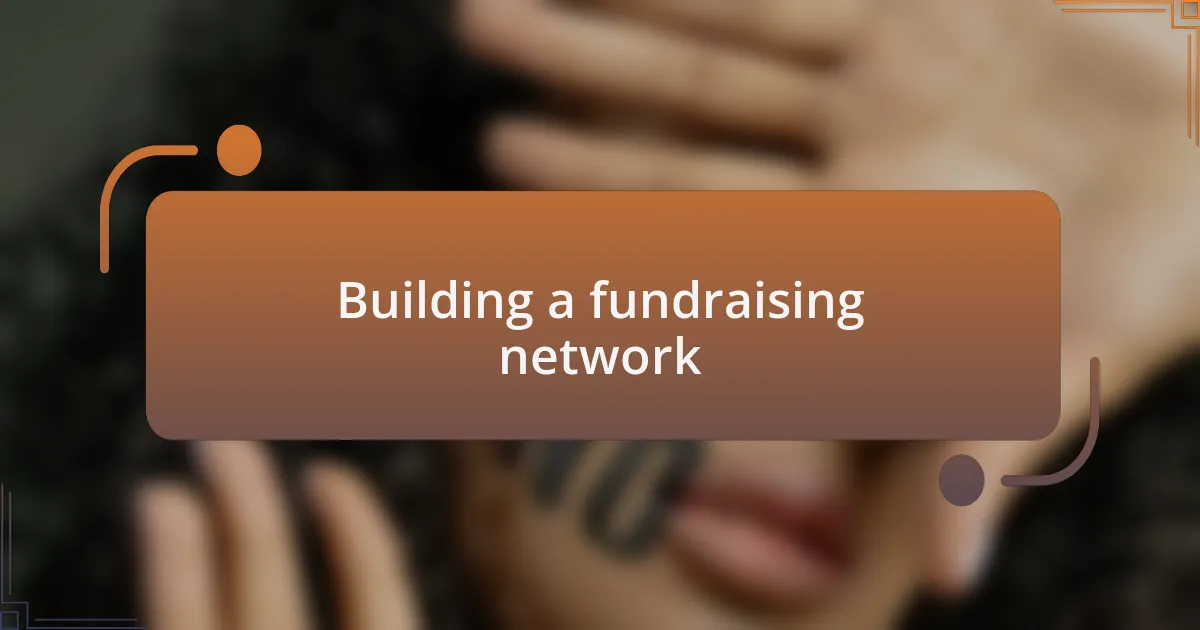
Building a fundraising network
Creating a robust fundraising network starts with nurturing relationships both online and offline. I recall attending a pro-life advocacy conference where I met other passionate individuals who shared valuable contacts and resources. Have you ever thought about how these face-to-face connections can lead to fruitful collaborations that amplify our reach and impact?
Another pivotal approach is to engage volunteers as ambassadors for your cause. I’ve seen firsthand how one dedicated volunteer mobilized her entire circle, turning casual acquaintances into passionate advocates. It’s amazing how enthusiasm can be contagious; when people feel invested in a project, they’ll naturally reach out to their own networks. How can you inspire your supporters to spread the word?
Lastly, consider offering incentives for referrals within your network. I once initiated a small competition where individuals could win recognition or even small prizes for bringing in new donors. It created a fun and engaging atmosphere while encouraging everyone to actively participate. Who doesn’t love a little friendly competition to drive results? By implementing these strategies, we can build a dynamic and interconnected community dedicated to our cause.
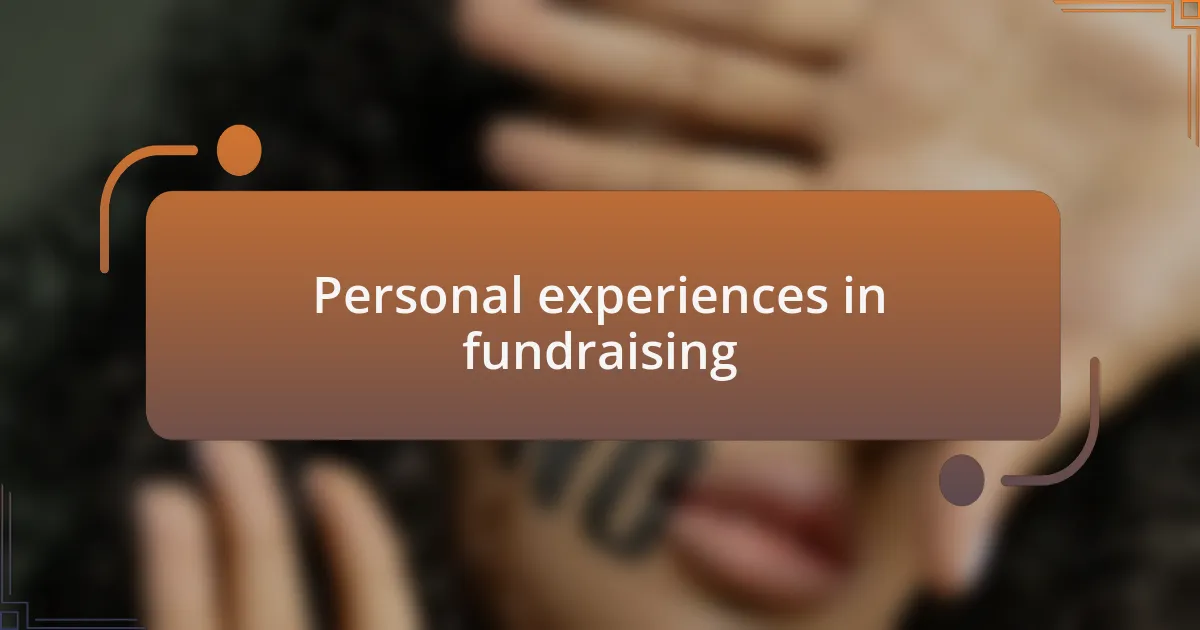
Personal experiences in fundraising
Fundraising can be a deeply personal journey, as I learned during my first major campaign. The excitement and anxiety were palpable as I reached out to my closest friends and family. Surprisingly, their support transformed my initial uncertainty into motivation. Reflecting on that experience, I often ask myself: how can we leverage our personal connections to foster a culture of giving within our broader networks?
One particularly rewarding experience was when I collaborated with local businesses for a fundraising event. I vividly remember a small café that agreed to donate a portion of their sales on our designated day. The owner’s commitment not only raised funds but also brought the community together around a cause we all believed in. How often do we overlook the power of local partnerships in enhancing our fundraising efforts?
Another moment that stands out was when we hosted a storytelling night, allowing individuals to share their journeys and connect with others on a personal level. I was amazed by the emotional resonance these stories created, encouraging attendees to contribute. It made me realize that fundraising is not just about money; it’s about building connections and fostering empathy. Have you considered how sharing personal stories can deepen the impact of your fundraising initiatives?
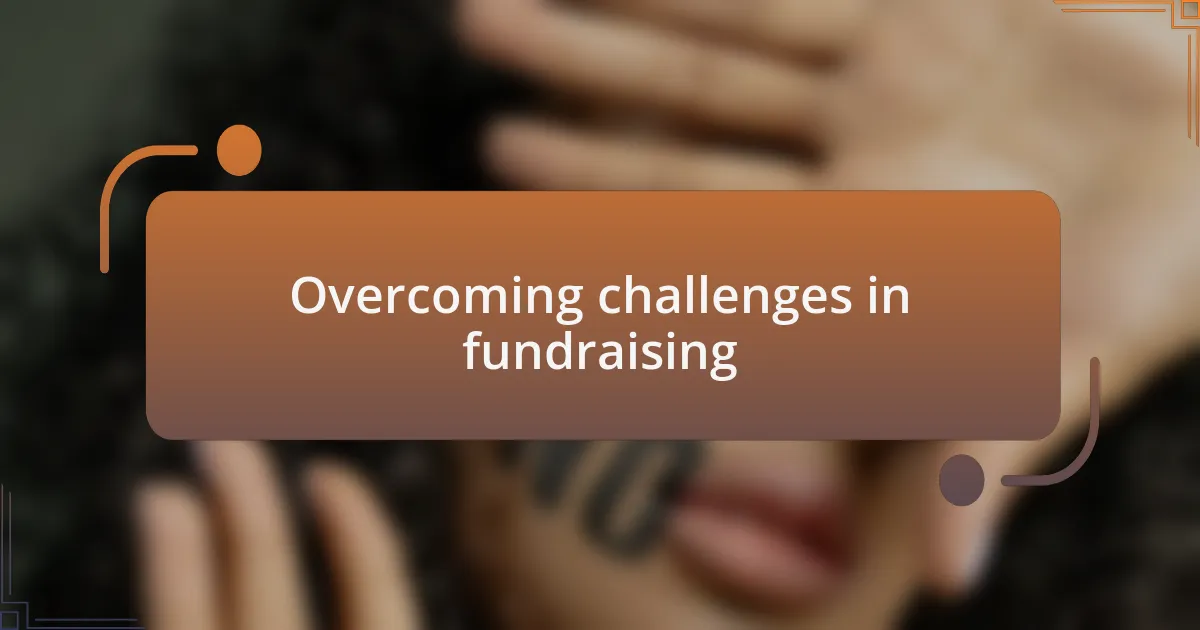
Overcoming challenges in fundraising
Overcoming challenges in fundraising often requires a shift in mindset. I remember struggling with the daunting task of meeting financial goals for a significant project. Instead of seeing it as a burden, I reframed it as an opportunity to engage with my community. How can we view these hurdles as chances for deeper connection and innovation?
One specific challenge I faced was a lack of initial interest in our campaign. I recall organizing a phone-a-thon, where I directly spoke to potential supporters about the cause. By sharing why it mattered to me personally, I noticed a change in their responses. How often do we underestimate the impact of our passion in inspiring others to join our cause?
There were moments when setbacks felt discouraging, particularly when a planned event flopped due to low turnout. Rather than dwelling on disappointment, I took it as a learning experience. Each failed attempt taught me more about my audience and what resonated with them. Isn’t it interesting how the road to success is often paved with failures that challenge us to adapt and grow?
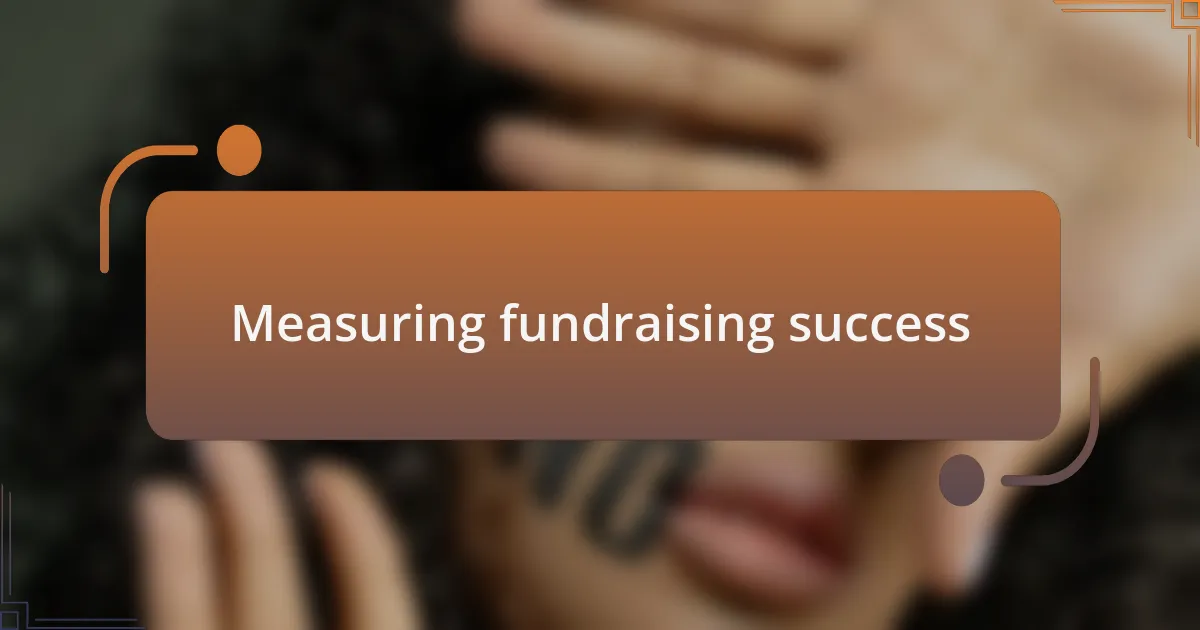
Measuring fundraising success
Measuring fundraising success goes beyond just looking at the dollars raised. When I reflect on my experiences, I remember one campaign where we exceeded our goal but still felt something was missing. It wasn’t until I analyzed the engagement levels of our supporters that I realized the true measure of success lies not only in financial contributions but also in the relationships we build along the way.
For instance, during a recent fundraiser, I tracked not just the funds but also how many new connections we made through social media interactions and community events. It was enlightening to see that even a small donation could come with a heartfelt story, emphasizing the emotional investment of our supporters. Reflecting on this made me ask myself, “Are we truly valuing the voices and motivations behind each contribution?”
In another case, a fundraising event turned into a platform for sharing personal testimonials, and the impact it created was profound. By measuring the success of that event through the stories shared, I learned that true success can be gauged by the inspiration we foster within our community. How are we leveraging these narratives to understand our success more deeply?